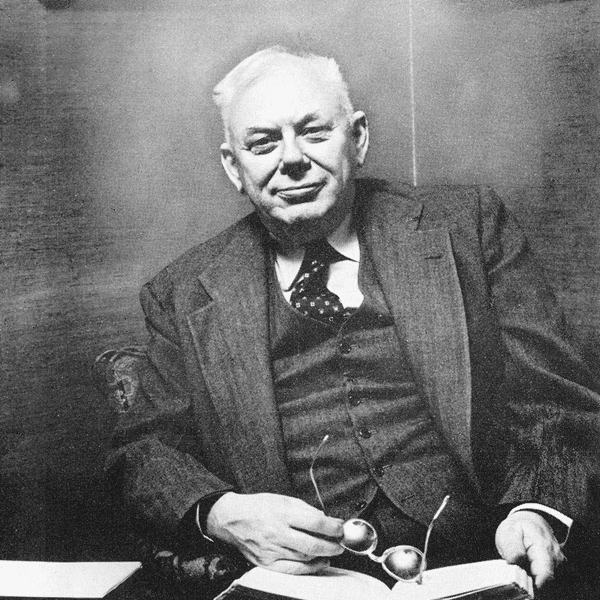Presidential Address
In Memoriam
From Perspectives, October 1984
Dexter Perkins (June 20, 1889–May 12, 1984), an internationally known authority on American diplomatic history and one of the great teachers in the University of Rochester’s history department, died Saturday, May 12, 1984, at the Brightonian Convalescent Care Center in Rochester, New York. He was 94.
An authority on Latin American relations and the Monroe Doctrine, he had served as an advisor to the US Department of State and other governmental and international agencies. In 1945, he was the official US historian at the San Francisco Security Conference where the United Nations was created.
Professor Perkins was instrumental in the founding of the Salzburg Seminar of American Studies in Austria and led a successful national fund drive in its behalf in 1950. He was a longtime member of the American Historical Association, serving as secretary from 1928 to 1939 and as president in 1956. He joined the University of Rochester faculty in 1915 and was Don Alonzo Watson Professor of History and chairman of the department from 1925 until his retirement in 1954 when he became the first John L. Senior Professor of American Civilization at Cornell University, serving until 1959.
On learning of Professor Perkins’ death, Robert L. Sproull, president of the University of Rochester, said: “The University, the city of Rochester, and the entire nation have lost one of their most stimulating historians. Under his direction, the University’s history department launched its first doctoral program and won national attention for its outstanding faculty and programs. He was the advisor for the first doctoral candidate to receive a PhD degree in history at Rochester in 1952. His ability to impart enthusiasm for his subject and his intellectual brilliance and integrity made his courses among the most popular at the University.”
At President Sproull’s inauguration as Rochester’s seventh chief executive in February, 1975, Perkins received one of the University’s first President’s Medals as one of three individuals, Sproull said, “who more than any others still with us are responsible for enlarging the scope of this institution from that of a college to that of a university.”
During the 1945–46 academic year, Perkins was the first holder of Cambridge University’s Chair of American History and Institutions. Upon his return to Rochester, he became first president of the newly created Rochester Association for the United Nations and later served as chairman of the board.
Among several books written by Perkins are Hands Off: The History of the Monroe Doctrine; America and Two Wars; The United States and the Caribbean; The Evolution of American Foreign Policy; The American Way; and The United States and Latin America. His autobiography, Yield of the Years, was published in 1969.
Perkins was city historian of Rochester from 1936 to 1948.
He was a member of the American Association of University Professors, a member of the board of editors of the American Historical Review, and a member of the Regional War Labor Board. He served as chairman of the Rochester branch of the Foreign Policy Association and as president of the Harley School.
A Phi Beta Kappa graduate of Harvard University in 1909, he received a PhD degree from Harvard in I914. He served as an instructor in history at the University of Cincinnati for a year before joining the Rochester faculty.
He is survived by his son, Bradford, and four grandchildren. Bradford has been a professor of history since 1962 at the University of Michigan and was winner of the 1965 Bancroft Prize in history from Columbia University. Professor Perkins’ wife, the late Wilma Lord Perkins, died Nov, 29, 1976.
Bibliography
The Monroe doctrine, 1823-1826, by Dexter Perkins. Cambridge: Harvard University Press; London: H. Milford, Oxford University Press, 1932
The history of Rochester libraries, Blake McKelvey, editor. Part II–Lewis H. Morgan’s European journal, Leslie A. White, editor. Compiled under the supervision of Dexter Perkins, city historian, by authority of the Board of Trustees of the Rochester Public Library. Rochester, N.Y., [Rochester] Historical Society, 1937.
Hands off; a history of the Monroe doctrine, by Dexter Perkins. Boston, Little, Brown and Company, 1941.
America and two wars, by Dexter Perkins. Boston: Little, Brown and Company, 1944.
The United States and the Caribbean. Cambridge: Harvard University Press, 1947
The evolution of American foreign policy. New York: Oxford University Press, 1948.
The story of U.S. foreign policy, by Dexter Perkins. Our future in the atomic age, by James Bryant Conant. New York: Foreign Policy Association, 1951.
The American approach to foreign policy. Cambridge: Harvard University Press, 1955.
Charles Evans Hughes and American democratic statesmanship. 1st ed. Boston: Little, Brown, 1956; Reprint, Westport, Conn.: Greenwood Press, 1978, c1956.
The American way. Ithaca: N.Y., Cornell University Press, 1957.
The new age of Franklin Roosevelt, 1932-1945. Chicago: University of Chicago Press, 1957.
The United States and Latin America. Baton Rouge: Louisiana State University Press, 1961.
America’s quest for peace. Bloomington: Indiana University Press, 1962.
The education of historians in the United States. Dexter Perkins, chairman, John L. Snell, director, and Committee on Graduate Education of the American Historical Association. New York: McGraw-Hill, 1962.
The diplomacy of a new age; major issues in U.S. policy since 1945. Bloomington: Indiana University Press, 1967.
Yield of the years; an autobiography. 1st ed. Boston: Little, Brown, 1969.
Foreign policy and the American spirit; essays. Edited by Glyndon G. Van Deusen and Richard C. Wade. Port Washington, N.Y., Kennikat Press, 1972, c1957.
